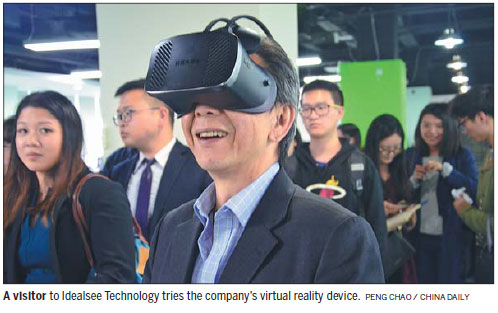Businesses flock to innovative center
The Chengdu city government announced at a conference on Nov 9 that it will develop the new economy as a strategic driving force for local growth, to build a modern economic system. Since then, a group of related projects have started to gather in the capital of Sichuan province.
Two weeks after the conference, nine projects were signed at the Chengdu Hi-tech Industrial Development Zone, with a total investment of 18.86 billion yuan ($2.85 billion). They cover diverse fields, including new retail, big data, artificial intelligence and healthcare.
At the signing ceremony on Nov 23, Guoxiaomei, a startup focusing on building self-service convenience stores for companies, said it will invest 5 billion yuan to construct its national headquarters and an industrial center at the zone.
The construction project also includes an operations center, a customer service center, artificial intelligence labs, smart hardware and logistics, as well as 100,000 square meters of intelligent warehouse management and supply chain systems.
Less than six months after its establishment, Guoxiaomei has secured over 400 million yuan of financing from several top venture capital firms, such as Alibaba and IDG Capital. With about 200 employees, the company has provided services to more than 1,500 companies nationwide.
Cainiao Network Technology, the logistics arm of Alibaba, plans to invest 3 billion yuan to build a regional operations center to deal with businesses in western and southern China.
Li Jun, an academician of the Chinese Academy of Engineering, announced the opening of a smart, internet-connected cars innovation center at the zone, with a total investment of 100 million yuan. It aims to build a new auto industry system highlighting the interaction among the drivers, the cars and the internet.
With its ideal environment for developing the new economy, Chengdu has been fostering a batch of potential unicorn companies - startups with a more than $1 billion market value.
The city is currently home to 31 potential unicorns. They cover nine industries such as healthcare, culture and entertainment, big data and new media, according to Greatwall Strategy Consultants.
Xgimi Technology, a company focusing on design, research and production of no-screen projector televisions, is one of them. Statistics from Beijing-based research firm Analysys showed that Xgimi ranked No 1 in 2015 in China's intelligent projection markets, with a 51.4 percent market share.
Zhong Bo, founder and CEO of the company, said Xgimi plans to build an international display technology research center and a precision optical device manufacturing center by working with its global leading partners.
Idealsee Technology, a virtual reality products company, moved its production plant from Shenzhen to Chengdu on Nov 2, with its 10 newly developed VR devices rolling off the production line that day at Aplus Labs, a business incubator in the city.
Since 2012, Idealsee has grown from a small firm of several employees into a company with about 200 staff members.
Li Xinyu, vice-president of the company, said he chose Chengdu because the city has a favorable business climate and can offer many high-quality employees due to its rich educational resources.
"The city government is willing to support companies to explore unknown and emerging fields, which is very valuable for startups," Li said.
By 2020, Chengdu plans to foster more than 100,000 new economy companies, including seven unicorns and 60 potential unicorns.
haonan@chinadaily.com.cn

(China Daily 12/08/2017 page7)














